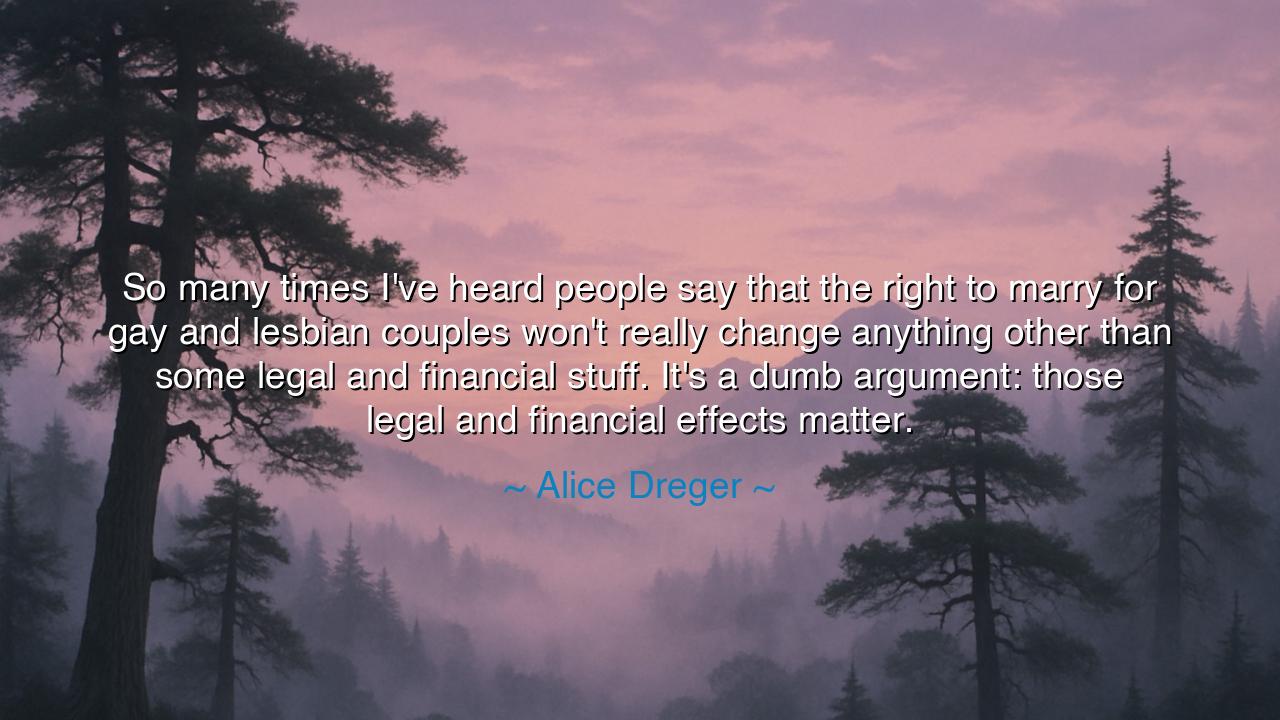
So many times I've heard people say that the right to marry for
So many times I've heard people say that the right to marry for gay and lesbian couples won't really change anything other than some legal and financial stuff. It's a dumb argument: those legal and financial effects matter.






Hearken, O seekers of wisdom, to the words of Alice Dreger, who spoke with clarity and conviction: "So many times I've heard people say that the right to marry for gay and lesbian couples won't really change anything other than some legal and financial stuff. It's a dumb argument: those legal and financial effects matter." In these words lies a meditation on the profound interplay between law, society, and the lived reality of human beings. Dreger reminds us that what may seem technical or procedural is, in truth, the very scaffolding upon which dignity, security, and equality rest.
Since the dawn of law, humans have recognized that legal rights are not mere abstractions; they are instruments that shape the very possibilities of life. In ancient Athens, citizenship conferred rights to property, speech, and marriage, and without it, individuals were constrained in almost every aspect of their existence. Dreger’s insight echoes this principle: for gay and lesbian couples, the right to marry is not symbolic alone—it transforms daily life through the legal and financial protections that marriage provides.
Consider the historical example of Loving v. Virginia (1967), where the United States Supreme Court struck down laws banning interracial marriage. Some contemporaries dismissed the case as affecting only ceremonial recognition, yet the legal and financial ramifications were enormous: inheritance, property rights, legitimacy of children, and recognition by society were all validated. Dreger’s argument is aligned with this truth: rights matter precisely because law shapes reality, and the absence of recognition imposes tangible constraints on life.
The financial effects Dreger mentions are neither trivial nor secondary. Marriage secures access to healthcare benefits, tax advantages, survivor protections, and decision-making authority in times of crisis. Denying these rights to gay and lesbian couples creates a system of inequality that affects wealth, stability, and personal security. Thus, Dreger’s insistence on the significance of these effects underscores a timeless principle: the law is not merely ceremonial; it is a practical instrument for justice and human flourishing.
Beyond law, there is the moral and social affirmation embedded in recognition. By granting the right to marry, society acknowledges the dignity of relationships historically marginalized. This mirrors the ancient practice of formal recognition in communities: marriage or covenant was not merely a private act, but a social endorsement that conferred status, protection, and legitimacy. Dreger reminds us that legality and equality are intertwined, and that denying such recognition perpetuates harm not only materially, but morally and socially.
The essence of her reflection is both pragmatic and profound: to argue that legal and financial effects “don’t matter” is to misunderstand the structure of human life. The law codifies our interactions, safeguards our futures, and protects the vulnerable. Dreger teaches that progress is not measured solely by sentiment or symbolism, but by the tangible empowerment and security that rights confer upon those historically denied them.
O seekers of wisdom, let this teaching guide your understanding. Recognize that the right to marry is not a trivial or abstract concept—it is a cornerstone of equality, a shield against vulnerability, and a foundation upon which human lives are made whole. To dismiss these effects is to ignore the enduring power of law to shape opportunity, security, and dignity.
Take this teaching into daily life: honor the legal structures that enable fairness, advocate for those whose rights remain constrained, and appreciate the real, tangible effects that recognition and equality bring. In doing so, you participate in the ancient and ongoing struggle to align human law with justice, ensuring that gay and lesbian couples, and all those denied equality, may live with the protections, security, and dignity that every person deserves. Dreger’s words remind us that justice is practical as well as moral—and that each legal victory transforms lives in profound and lasting ways.






AAdministratorAdministrator
Welcome, honored guests. Please leave a comment, we will respond soon